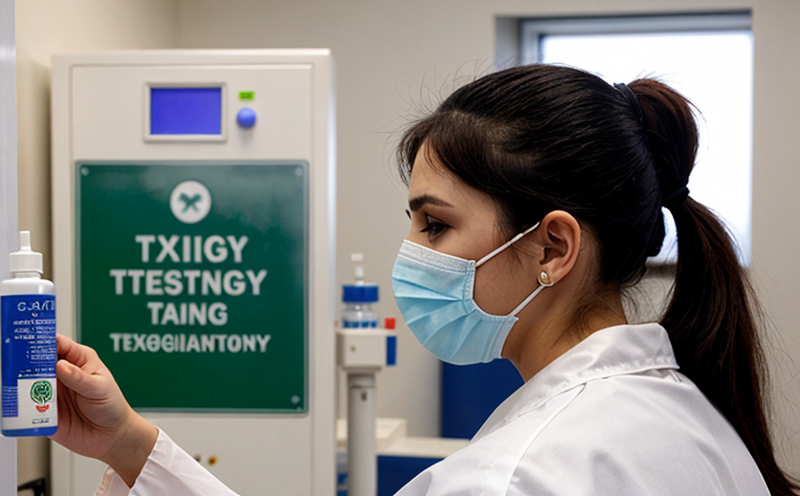CNS Safety Motor Coordination Testing
In the realm of Pharmaceutical Testing, particularly within Toxicology & Safety Pharmacology, Central Nervous System (CNS) safety motor coordination testing is a critical step in ensuring drug safety and efficacy. This testing evaluates how CNS active compounds affect motor functions, including balance, coordination, and reflexes. It plays a vital role in the regulatory approval process, as it helps identify potential side effects that could impact patient quality of life.
The CNS motor coordination tests are not only essential for new drug development but also crucial for the safety assessment of existing medications being modified or repurposed. Regulatory bodies such as the FDA and EMA mandate these evaluations to ensure that the drugs do not cause adverse effects on patients' motor skills, which can significantly impair daily activities.
The testing process involves exposing subjects to CNS active agents under controlled conditions. The motor functions are then monitored using a variety of tools and techniques, including gait analysis systems, reflex time measurement devices, and precision grip testers. These tests can be conducted on both human volunteers and animal models, depending on the regulatory requirements and the phase of drug development.
The primary aim is to assess whether any CNS active compound disrupts motor coordination in a significant way that could pose a safety risk. This includes evaluating how the compound affects the cerebellum's role in maintaining balance and coordination. The cerebellum, often referred to as the "little brain," is crucial for these functions and any interference can lead to serious health issues.
Pharmaceutical companies rely on comprehensive CNS motor coordination tests to identify potential side effects early in development. By incorporating this testing into their R&D pipeline, they can make informed decisions about drug modifications or alternative routes of administration that minimize the risk of adverse effects. This approach not only enhances patient safety but also streamlines the drug approval process by ensuring compliance with international standards.
International standards such as ISO and ASTM provide guidelines for conducting CNS motor coordination tests, ensuring consistency and reliability across different laboratories. Compliance with these standards is crucial to gaining acceptance from regulatory bodies in various countries.
- ISO 10993-22: Biocompatibility evaluation of medical devices involving systemic exposure.
- ASTM E1764: Specification for the Use of Gait Analysis Systems in Evaluating Motor Coordination.
The testing process involves rigorous sample preparation and precise instrumentation to ensure accurate results. Specimens are typically collected from patients or animals, depending on the study design, and undergo various tests designed to simulate real-world conditions. The data gathered is then analyzed using statistical methods to determine any significant changes in motor coordination.
In summary, CNS safety motor coordination testing is a cornerstone of pharmaceutical safety assessment. It ensures that drugs do not cause adverse effects on patients' motor functions, thereby enhancing overall patient safety and regulatory compliance. By adhering to international standards and employing advanced testing methodologies, laboratories can provide reliable, accurate, and consistent test results.
Benefits
The benefits of CNS safety motor coordination testing are multifaceted and extend across multiple stakeholders in the pharmaceutical industry. For quality managers and compliance officers, this testing ensures that drugs meet stringent regulatory requirements, thereby reducing the risk of post-market recalls and adverse event reports. This not only protects public health but also enhances brand reputation and customer trust.
R&D engineers benefit from early identification of potential side effects during drug development. By incorporating CNS motor coordination tests into their pipeline, they can make data-driven decisions that optimize drug efficacy while minimizing safety risks. This approach accelerates the drug approval process by providing robust evidence of the drug's safety profile.
For procurement teams, ensuring compliance with international standards is crucial for sourcing reliable and high-quality testing services. By partnering with reputable laboratories that offer CNS motor coordination testing, they can secure the best possible outcomes for their projects. This partnership also fosters a culture of innovation and excellence within the organization.
The overall benefit lies in the enhanced safety and efficacy of pharmaceutical products. Patients are protected from potential adverse effects on their motor functions, leading to improved quality of life. Regulatory bodies appreciate the thoroughness of such testing, which contributes to the integrity of drug approval processes worldwide.
Why Choose This Test
Selecting CNS safety motor coordination testing is a strategic decision that aligns with global regulatory requirements and industry best practices. By choosing this test, pharmaceutical companies demonstrate their commitment to patient safety and compliance. Here are several reasons why this test should be prioritized:
- Regulatory Compliance: Meeting the stringent standards set by organizations like the FDA and EMA ensures that drugs can be approved for market release.
- Patient Safety: Identifying potential side effects early in development minimizes risks to patients, enhancing overall safety.
- Accelerated Approval Process: Reliable data from CNS motor coordination tests expedites the drug approval process by providing robust evidence of safety and efficacy.
- Enhanced Reputation: Consistent compliance with international standards builds a strong reputation among stakeholders and enhances brand credibility.
The thoroughness and reliability of CNS motor coordination testing make it an indispensable tool in the pharmaceutical industry. It ensures that drugs not only work effectively but also do so safely, contributing to the long-term success of pharmaceutical companies.





